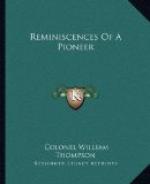Saddles, packs, provisions, and blankets were piled up at the ferry landing and the most stupendous amount of luggage ever carried by a hobo was then, one after another, piled on the backs of footmen. The footman would stand within a step of the boat and, after his luggage was piled on his back, would make a step on to the boat, and drop his load. Often two and three men would steady him until the step was made. All was fun and laughter except to Cushman and his partner. While this was going on, others had crowded the horses to the river bank and were endeavoring to make them swim the river. But try as they would, the horses upon striking the swift current of the river would swing around and come out on the same side. It was now Cushman’s time to laugh. In this extremity a reward of $20 was offered any one who would swim his horse ahead of the band and guide them over. I quickly volunteered. I wanted the twenty, and I wanted to save my dollar. Some of the older men objected. But I had swum my horse across the Williamette River and the insignificant John Day, not a fourth as wide, had no terrors for me. Mounting my horse, I rode down into the river until almost swimming. Meantime I had divested myself of all clothing save that provided by mother nature, and having loaded my saddle and effects on the back of my partner, fastened my right hand in my horse’s mane and gave the word. Sliding off on the lower side I guided my horse with my hand and he took the current of the stream like a steamboat. The other horses to an animal followed, and in a few moments were all safely on the other shore. The crowd cheered heartily and even Wall Cushman could not restrain his feelings, but exclaimed, “My boy, you are a brick.”
The $20 was not only given me, but several who had not contributed to the first “pot” gave a half dollar. Altogether I was handsomely paid for my few moment’s work, and as the water was not cold, I rather enjoyed the swim.
From there we went to Walla Walla, following the old Nez Perce trails. At that time there were not a dozen habitations between the Dalles and Walla Walla, where now is a densely settled country and one of the great wheat belts of the continent. A few days after crossing the John Day I made my first horse trade. An old school teacher in the company fell in love with my horse, and not only gave me a better animal, but almost the value of my own to boot. I began then to flatter myself that I was not only a traveler, but a business man as well. But alas! I had many a sad lesson to learn ere I got my “teeth cut.”
Arriving at Walla Walla, then a small village, with a Government post half a mile away, we purchased a few supplies and then pushed on to the mines. Going down the Alpowwa I saw apple trees planted by Father Spaulding, of blessed memory, in 1836. The trees were thrifty and some of them very large, and were being cared for by Nez Perce Indians. The good Father Spaulding, with other Presbyterian




